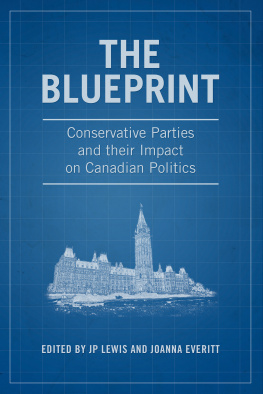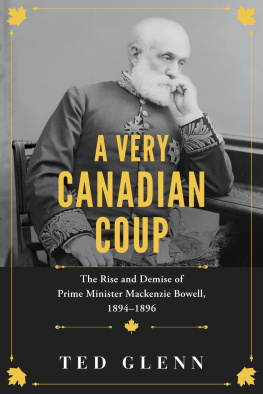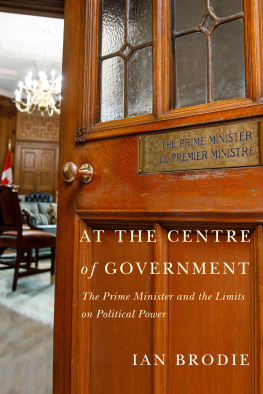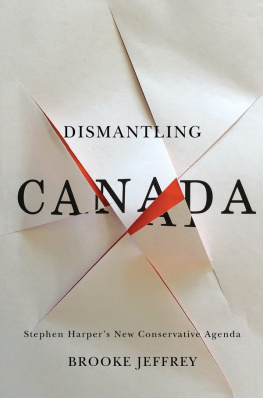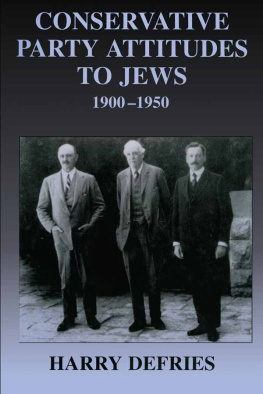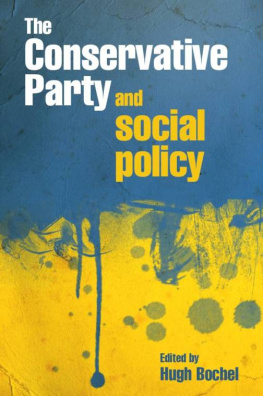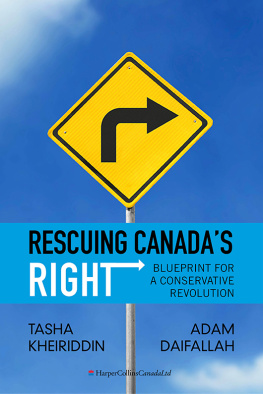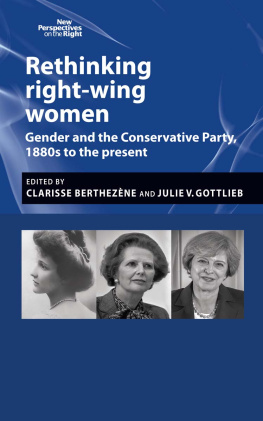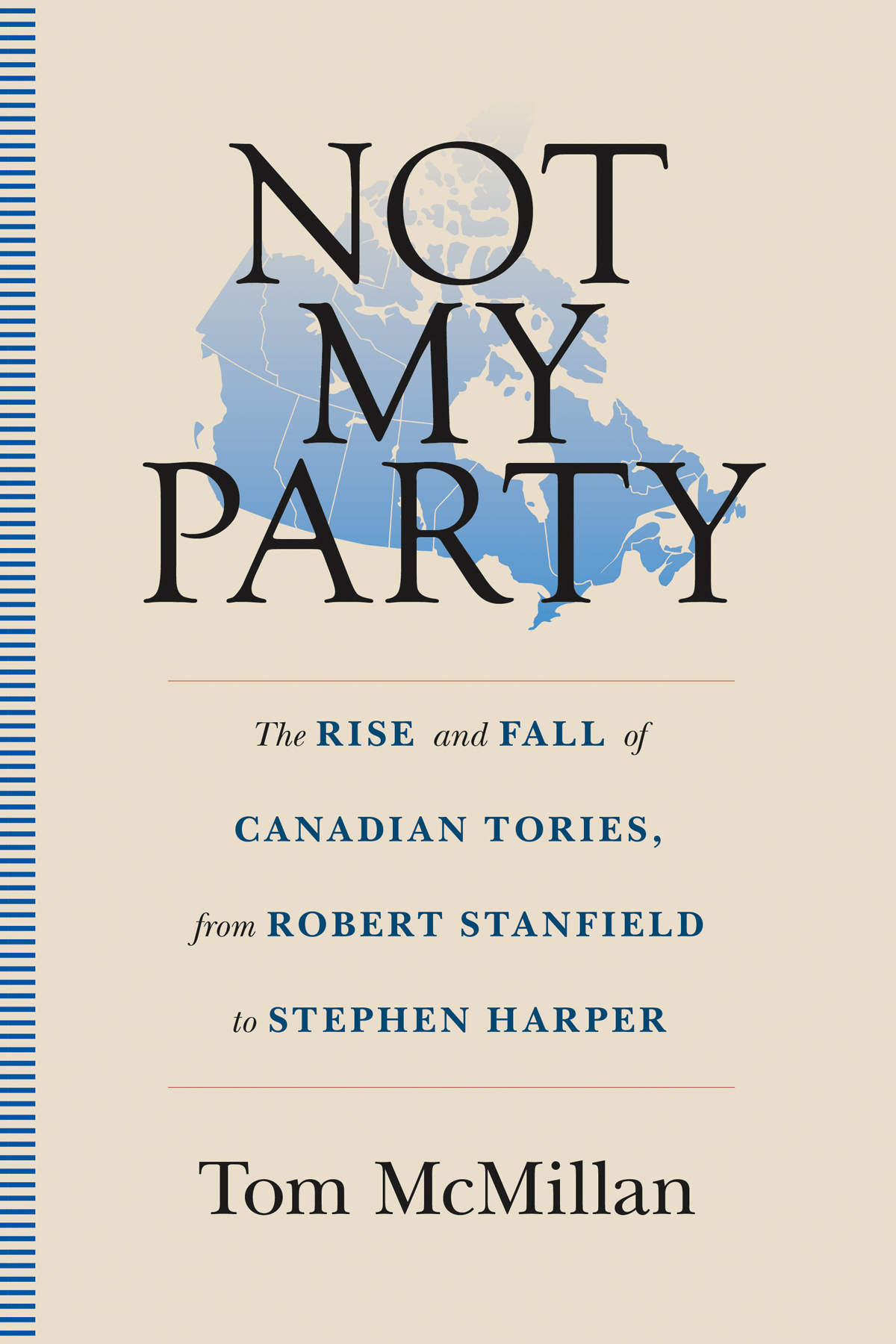Copyright 2016, Tom McMillan
All rights reserved. No part of this book may be reproduced, stored in a retrieval system or transmitted in any form or by any means without the prior written permission from the publisher, or, in the case of photocopying or other reprographic copying, permission from Access Copyright, 1 Yonge Street, Suite 1900, Toronto, Ontario M5E 1E5.
Nimbus Publishing Limited
3731 Mackintosh St, Halifax, NS, B3K 5A5
(902) 455-4286 nimbus.ca
Printed and bound in Canada
NB1265
Cover and interior design: Jenn Embree
Library and Archives Canada Cataloguing in Publication
McMillan, Tom, 1945-, author
Not my party : the rise and fall of Canadian Tories, from Robert Stanfield to Stephen Harper / Tom McMillan.
Issued in print and electronic formats.
ISBN 978-1-77108-423-9 (paperback).ISBN 978-1-77108-424-6 (html)
1. ConservatismCanada. 2. Conservative Party of Canada. 3. McMillan, Tom, 1945-. 4. Harper, Stephen, 1959-. 5. Canada--Politics and government20th century. 6. CanadaPolitics and government2006-2015. I. Title.
FC641.M36A3 2016 971.06 C2016-903751-7
C2016-903752-5
Nimbus Publishing acknowledges the financial support for its publishing activities from the Government of Canada through the Canada Book Fund (CBF) and the Canada Council for the Arts, and from the Province of Nova Scotia. We are pleased to work in partnership with the Province of Nova Scotia to develop and promote our creative industries for the benefit of all Nova Scotians.
For Kelly, Becky, and Emily
in loving memory of Eileen (McMillan) Fulford
Politics is more difficult than physics.
Albert Einstein
Introduction
T his book is a memoir of my life in politics: first as a political operative, then as an elected politician, later as a non-career diplomat, and finally as a candidate for office yet again before retiring from the game altogether. But the book is not just a memoir. I also discuss my personal search for the meaning of Canadian conservatism throughout a long public career in which I both observed and practised it.
The story first focuses on two men: a Tory leader, Robert Stanfield; and a university president, Tom Symons. It tells how, in the 1960s and 1970s, they quietly and discreetly, but steadily and undeniably, transformed and modernized the policies and image of the Progressive Conservative Party of Canada. Their work followed a decade of erratic, and often reactionary, leadership by John Diefenbaker, with his increasingly anachronistic brand of prairie populism. Diefenbakers biographer, Denis Smith, characterized his subject as a rogue, a leader whose personality and stands on issues constituted a marked departure for the PCs. By restoring the party to its pre-Diefenbaker leadership and policy traditions, Stanfield, in partnership with Symons, engaged in what I call a counter-revolution. In telling that story, I discuss my own relationship with the two men who led it. My role was principal functionary in the PC leaders extraparliamentary policy process. It gave me a ringside seat to witness one of the most extraordinary partnerships in the history of party politics in Canada.
I am especially interested in the Stanfield-Symons legacy in the context of the Conservative Partys 2003 marriage to the Reform/Canadian Alliance Party and the new identity the party adopted, under Stephen Harpers leadership, following that merger. Was Harper committed to the rich heritage and historic values of the grand old party of Sir John A. Macdonald and Georges-tienne Cartier, to the Conservative/Liberal coalition tradition they launched in the 1850s, before Canada was even born? That tradition survived long after the coalition itself dissolved. Or, instead, did Harper perpetrate a hostile takeover of this great national institution, then render it but a shadow of its former selfand a very dark shadow at that? To me, those questions have gained relevance since the October 2015 federal election, when anyone but Harper strategic voting coalesced behind Justin Trudeaus Liberals to oust Stephen Harper from power, just as a bars security guard would evict an unruly patron: on his backside.
Harpers abrupt resignation as party leader, the PCs need to find a new one, and their return to the familiar role of official opposition in Parliament inevitably will force the party to address fundamental questionstwo, in particular. First, should the Conservative Party continue as the kind of national political party many people think it became after Harper orchestrated the 2003 merger in concert with then-PC leader Peter MacKay? Critics of the merger believe it caused the historic Conservative Party to morph from a progressive party that embraced economic and social values rooted in Canadian tradition into a US Republican-style or neoconservative party foreign to that tradition. Second, if those critics are correct, and in light of the 2015 election results, does the Conservative Party now need to chart a far different course: more centrist, less ideological, less religiously directed, and one much closer to that which it followed for almost a century and a half before the merger?
In the post-Harper era, I believe the Conservative Party needs to embrace the kinds of progressive policiesand the values that underpinned themfor which Robert Stanfield stood. While writing the book, I found it illuminating to contrast Stanfields leadership, including his temperament and management style, with Brian Mulroneys to help explain why Stanfield and Symons worked so well as a policy team. I was PC deputy House leader the entire time Mulroney was opposition leader (198384). In that role, I soon got a clear view of how Mulroneys policy mind and political instincts operated. My fraternal twin, Charley, was Mulroneys chief policy advisor from the time Mulroney first sought the PC leadership in 1976 to well into his time as prime minister about a decade later. Both at the time and long afterwards, Charley shared with me his insights into Mulroneys political and governing style and, indeed, into the man himself. I weave many of Charleys insights into the narrative. I also provide my own reflections on Mulroney, underscoring his deep roots in, and self-identification with, the Maritimes and the regions impact on the mans politics and personal growth. No doubt, this twin perspective about Canadas eighteenth prime minister is unique.
Throughout the book, I draw heavily on my political experiences in Prince Edward Island, because that is where my electoral career was mostly based. I also sometimes focus on the Island because, small as it is, PEIand Atlantic Canada more generallypractises a type of politics that can teach valuable lessons not restricted by either geography or the particular periods discussed. The role of the media in political campaignsspecifically as partisan actors, whether journalists acknowledge it or notis a case in point. This book concerns much more than Atlantic Canadian politics, though that is its rudder. It is also about national politics, albeit through the eyes of a former politician steeped, virtually from birth, in a distinct political culture indigenous to the region.
The book is not a work of scholarship. But I am a political scientistat least in education, if not as a lifelong practitioner. As such, I am confident that the story breaks new ground on two important fronts. First, it fills a gap in the history of the PC Party, still a barren land in Canadian studies, particularly relating to Atlantic Canada. Robert Stanfield inarguably was the most outstanding and widely respected national public figure to emerge from this region in the last half of the twentieth century. I find it strange, therefore, that no one has yet written a biography covering this towering figures full public career, merely parts of it. This book is not that comprehensive biography. I have, however, tried to fill some of the void. I stress Stanfields politics of thoughtfulness legacy and the impact various factors have had on it, for good or ill, over the years since then. Those factors include both the actions and policies of subsequent PC leaders and certain changes in the political culture more generally, among them the growing influence of television (especially House of Commons Question Period coverage) and of social media. The second new ground the book ploughs is its demonstration and analysis of how one of our three major national political parties developed and used policy and, in doing so, profoundly influenced laws and government practices in Canada to this day. I also hope to shed light on certain dimensions of Canadian politics more generally. Some countries, notably the United Kingdom, have a long and rich tradition in which former politicians reflect on and write about their experiences in government and in politics. Such a tradition is not nearly as strong in our own country. It is weakest of all outside central Canada, and particularly in Atlantic Canada. I seek to add to that tradition. Although the main reach of the book is not historical but contemporarywhat the Conservative Party of Canada is today and where it is headedmy emphasis on the partys past reflects my strong belief that therein lies the marker for the partys future. Indeed, I worry about whether it has any future at all as the distinguished national institution it once was.


